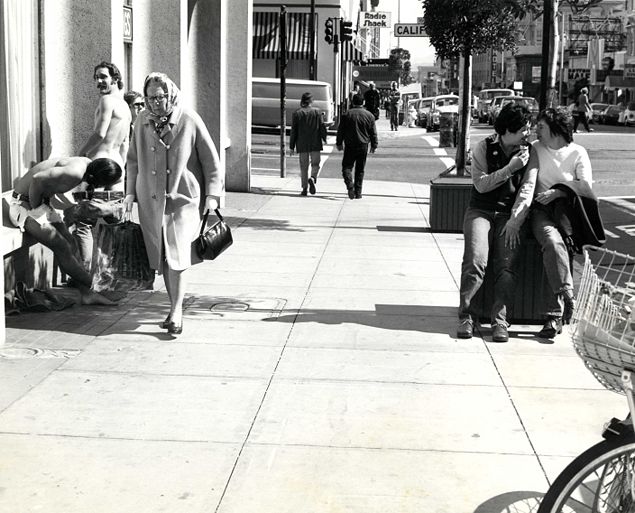Polk Street Merchants Push Back
Text by Joey Plaster. Copyright (©) by C. Joey Plaster, 2009. All rights reserved.
Polk Gulch merchants viewed this influx with alarm. While intergenerational and commercial sex had long been a part of the culture, and merchants hired attractive youth to bartend and wait tables, they perceived the movement of “trade” hustling to the street as a threat to their economy.
They responded by calling on what were now strong connections with City Hall. In 1977, merchants met with Mayor Moscone to complain about the “teen-age prostitutes, drug addicts and shoplifters are turning Polk Street into a nightmare – ‘the Haight Ashbury of the ‘70s.’” The president of the Polk Street Merchant’s Association said, “old ladies with white gloves aren’t shopping on Polk Street anymore.”[1]
The owner of the Town Squire complained that “street youth, many of them gay hustlers,” called women entering his store “the filthiest names you’ve ever heard.”[2] The owner of one restaurant said he was closing his business after his window was shattered yesterday for the fifth time in two years. “People are afraid of the punks,” he said. “They’re dangerous.”[3]
The Mayor responded with a sustained police sweep, for which hundreds of merchants congratulated the Northern Station in a lavish formal ceremony at the P.S. Lounge, including Mayor Moscone and the police chief, for “removing the criminal element from our streets.”
These included prostitutes, drug dealers, and panhandlers “believed to be displaced…from the Market Street and Tenderloin areas where successful police efforts were making it difficult for these would-be lawbreakers,” said the president of the association, an owner of a liquor store. “Today, these officers continue to patrol the streets of our area insuring that the criminal element does not attempt once again to move in.” The association president framed the sweep as a gay rights victory: it “enabled all residents to pursue their lifestyles peacefully and successfully,” he said.[4]
Others framed the sweep as a curtailment of civil liberties that ran counter to gay rights struggles. One newsletter complained of “Anita Bryant’s Vagrancy Law:” “Now you can get busted for ‘standing’, ‘sitting’, or even ‘being’ in private doorways or on your street!,” it read, noting that City Hall ordered the sweeps just before the November city election.[5] In early 1978, the ACLU noted “numerous complaints…that the [loitering] ordinance has been extensively used by the police as a means to harass come Gays on Polk Street.”[6]
Merchants won several large-scale police sweeps from 1977 to 1981, as they sought to eject the displaced population, while activists and citizens continued to complain of indiscriminate checks by police, citations for jaywalking, police harassment, and in some cases abuse.
The late 1970s saw the Polk gay business community at their economic and political peak. San Francisco saw its first district-based elections in November 1977, after which the sources of power that had drawn from downtown citywide base, including downtown business and labor, “found their influence strongly reduced, while neighborhood groups grew in power.”[7]
“The Polk Street Merchants Association was always very powerful politically,” Friday said. Polk Street “could make or break some local politicians….This is a small town. If you want to run for supervisor especially in a district…you’re naturally going to kiss ass to the merchants in the community, cause the merchants have the money.”[8]
Between August and September 1981, Mayor Feinstein ordered a massive, sustained police sweep on Polk Street at the behest of merchant association members concerned about the number of street youth on the street impinging on their business. Police made 449 arrests on Polk Street. But the aftermath of these sweeps, the result of a number of economic and political convergences, would result in a significant change for the neighborhood as the city shifted their approach to managing street youth.
- ↑ “Polk St. a jungle, merchants gripe,” San Francisco Examiner, Sept. 30, 1977, p. 4 c. 1
- ↑ Ibid.
- ↑ “Polk Street’s ‘punks’ anger merchants,” San Francisco Chronicle, Sept 30, 1977, p. 3 c. 1
- ↑ “Police Honored By Polk Area Merchants,” Bay Area Reporter, 1/19/78.
- ↑ “Repeal Anita Bryant’s New Vagrancy Law in S.F.,” Polk Street News No. 2, Sept. 1977.
- ↑ “Polk Harassment? ACLU Protests New Loitering Law,” Bay Area Reporter, 3/2/78.
- ↑ Hartman, City for Sale, 234.
- ↑ Interview with Wayne Friday by Joey Plaster, 2008.
